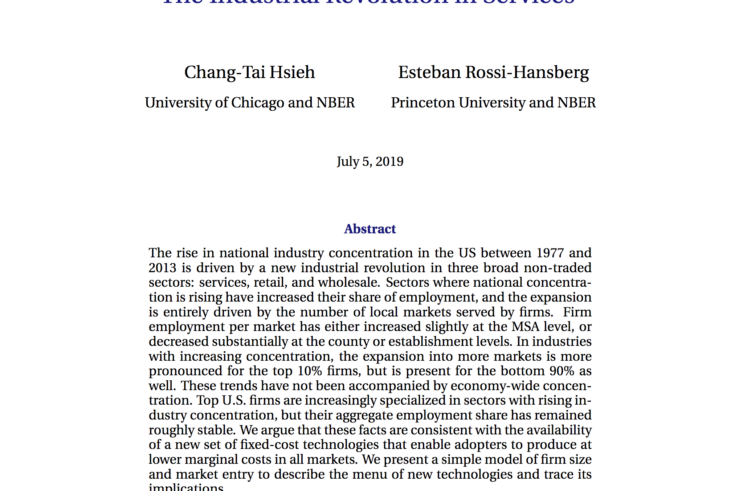Showing archive for: “Structure–Conduct–Performance”
Reining in Digital Competition to No Good End: Will AICOA and OAMA Rise from the Grave?
The 117th Congress closed out without a floor vote on either of the major pieces of antitrust legislation introduced in both chambers: the American Innovation and Choice Online Act (AICOA) and the Open Apps Market Act (OAMA). But it was evident at yesterday’s hearing of the Senate Judiciary Committee’s antitrust subcommittee that at least some ... Reining in Digital Competition to No Good End: Will AICOA and OAMA Rise from the Grave?
The Contestable Platform Paradox
Why do digital industries routinely lead to one company having a very large share of the market (at least if one defines markets narrowly)? To anyone familiar with competition policy discussions, the answer might seem obvious: network effects, scale-related economies, and other barriers to entry lead to winner-take-all dynamics in platform industries. Accordingly, it is ... The Contestable Platform Paradox
What if rising concentration were an indication of more competition, not less?
An oft-repeated claim of conferences, media, and left-wing think tanks is that lax antitrust enforcement has led to a substantial increase in concentration in the US economy of late, strangling the economy, harming workers, and saddling consumers with greater markups in the process. But what if rising concentration (and the current level of antitrust enforcement) ... What if rising concentration were an indication of more competition, not less?
Rising Concentration, Rising Prices: Not So Fast
Wall Street Journal commentator, Greg Ip, reviews Thomas Philippon’s forthcoming book, The Great Reversal: How America Gave Up On Free Markets. Ip describes a “growing mountain” of research on industry concentration in the U.S. and reports that Philippon concludes competition has declined over time, harming U.S. consumers. In one example, Philippon points to air travel. ... Rising Concentration, Rising Prices: Not So Fast
Why Don’t People Talk About Breaking Up Microsoft?
[This post is the seventh in an ongoing symposium on “Should We Break Up Big Tech?” that features analysis and opinion from various perspectives.] [This post is authored by Alec Stapp, Research Fellow at the International Center for Law & Economics] Should we break up Microsoft? In all the talk of breaking up “Big Tech,” ... Why Don’t People Talk About Breaking Up Microsoft?
This Too Shall Pass: Unassailable Monopolies That Were, in Hindsight, Eminently Assailable
[N]ew combinations are, as a rule, embodied, as it were, in new firms which generally do not arise out of the old ones but start producing beside them; … in general it is not the owner of stagecoaches who builds railways. – Joseph Schumpeter, January 1934 Elizabeth Warren wants to break up the tech giants ... This Too Shall Pass: Unassailable Monopolies That Were, in Hindsight, Eminently Assailable
Senator Warner’s retrogressive proposals could lead to arbitrary and capricious interventions that would harm entrepreneurs and consumers
Last week, I objected to Senator Warner relying on the flawed AOL/Time Warner merger conditions as a template for tech regulatory policy, but there is a much deeper problem contained in his proposals. Although he does not explicitly say “big is bad” when discussing competition issues, the thrust of much of what he recommends would ... Senator Warner’s retrogressive proposals could lead to arbitrary and capricious interventions that would harm entrepreneurs and consumers
The European Commission’s Google Android decision takes a mistaken, ahistorical view of the smartphone market
What to make of Wednesday’s decision by the European Commission alleging that Google has engaged in anticompetitive behavior? In this post, I contrast the European Commission’s (EC) approach to competition policy with US antitrust, briefly explore the history of smartphones and then discuss the ruling. Asked about the EC’s decision the day it was announced, ... The European Commission’s Google Android decision takes a mistaken, ahistorical view of the smartphone market
What’s hip (in antitrust) today should stay passé: Henry G. Manne on “hipster antitrust”
Today would have been Henry Manne’s 90th birthday. When he passed away in 2015 he left behind an immense and impressive legacy. In 1991, at the inaugural meeting of the American Law & Economics Association (ALEA), Manne was named a Life Member of ALEA and, along with Nobel Laureate Ronald Coase, and federal appeals court ... What’s hip (in antitrust) today should stay passé: Henry G. Manne on “hipster antitrust”
Amazon and the Unwisdom of the Populist Crowd
There are some who view a host of claimed negative social ills allegedly related to the large size of firms like Amazon as an occasion to call for the company’s break up. And, unfortunately, these critics find an unlikely ally in President Trump, whose tweet storms claim that tech platforms are too big and extract unfair rents ... Amazon and the Unwisdom of the Populist Crowd
Section 5 of the FTC Act and monopolization cases: A brief primer
In the past two weeks, Members of Congress from both parties have penned scathing letters to the FTC warning of the consequences (both to consumers and the agency itself) if the Commission sues Google not under traditional antitrust law, but instead by alleging unfair competition under Section 5 of the FTC Act. The FTC is rumored to be ... Section 5 of the FTC Act and monopolization cases: A brief primer
New Technology in Europe
Last week the New York Times ran an article, “Building the Next Facebook a Tough Task in Europe“, by Eric Pfanner, discussing the lack of major high tech innovation in Europe. Eric Pfanner discusses the importance of such investment, and then speculates on the reason for the lack of such innovation. The ultimate conclusion is ... New Technology in Europe







